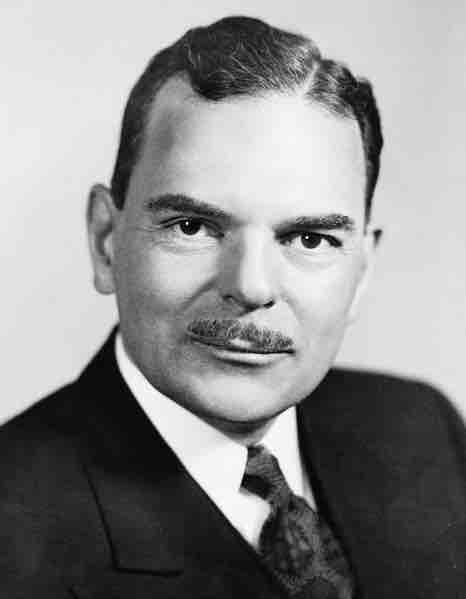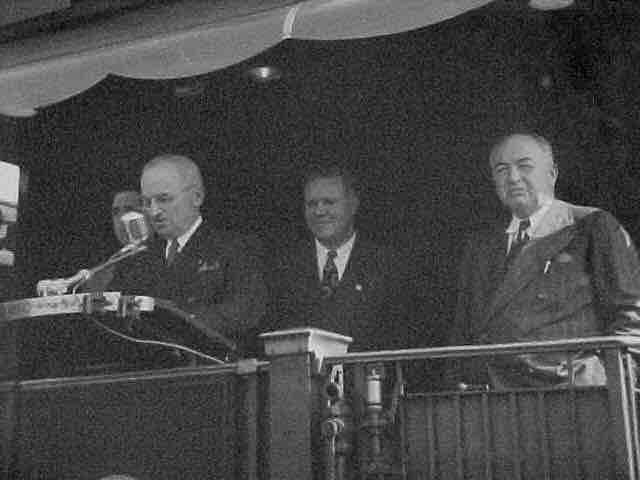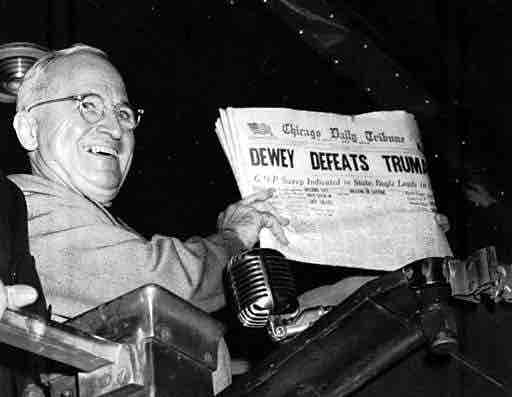The United States presidential election of 1948 was the 41st quadrennial presidential election, held on Tuesday, November 2, 1948. Incumbent President Harry S. Truman, the Democratic nominee, who had succeeded to the presidency after the death of President Franklin D. Roosevelt in 1945, successfully ran for election for a full term against Thomas E. Dewey, the Republican nominee.
The election is considered to be the greatest election upset in American history. Virtually every prediction (with or without public opinion polls) indicated that Truman would be defeated by Dewey. The Democratic Party had a severe three-way ideological split, with both the far left and far right of the Party running third-party campaigns. Truman's surprise victory was the fifth consecutive presidential win for the Democratic Party, the longest winning streak in the history of the party, and second-longest in the history of both modern parties (surpassed only by the Republicans' six consecutive victories from 1860 to 1880). With simultaneous success in the 1948 congressional elections, the Democrats regained control of both houses of Congress, which they had lost in 1946. Truman's feisty campaign style energized his base of traditional Democrats, consisting of most of the white South, as well as Catholic and Jewish voters; he also surprisingly fared well with Midwestern farmers. Thus, Truman's election confirmed the Democratic Party's status as the nation's majority party.

Thomas Dewey
Republican Thomas Dewey ran against President Harry Truman in the 1948 presidential election.
On September 9, nearly two months before election day, pollster Elmo Roper announced that "Thomas E. Dewey is almost as good as elected...I can think of nothing duller or more intellectually barren than acting like a sports announcer who feels he must pretend he is witnessing a neck-and-neck race." Because of his position in the polls, Dewey ran a bland, uninspired campaign .
Given Truman's sinking popularity and the seemingly fatal three-way split in the Democratic Party, Dewey appeared unbeatable. Top Republicans believed that all their candidate had to do to win was to avoid major mistakes; in keeping with this advice, Dewey carefully avoided risks. He spoke in platitudes, avoided controversial issues, and was vague on what he planned to do as president. Speech after speech was filled with non-political, optimistic assertions of the obvious, including the now infamous quote "You know that your future is still ahead of you." An editorial in The (Louisville) Courier-Journal summed it up as such: "No presidential candidate in the future will be so inept that four of his major speeches can be boiled down to these historic four sentences: Agriculture is important. Our rivers are full of fish. You cannot have freedom without liberty. Our future lies ahead."
Truman, trailing in the polls, decided to adopt a slashing, no-holds-barred campaign. He ridiculed Dewey by name, criticized Dewey's refusal to address specific issues, and scornfully targeted the Republican-controlled 80th Congress with a wave of relentless and blistering partisan assaults. Truman toured much of the nation with his fiery rhetoric, playing to large, enthusiastic crowds. "Give 'em hell, Harry" was a popular slogan shouted out at stop after stop along the tour. The polls and the pundits, however, all held that Dewey's lead was insurmountable, and that Truman's efforts were for naught. Indeed, Truman's own staff considered the campaign a last hurrah. Even Truman's own wife Bess had private doubts that her husband could win. The only person who appears to have considered Truman's campaign to be winnable was the president himself, who confidently predicted victory to anyone and everyone who would listen to him.

Harry Truman campaigning on the road
A whistle stop train tour campaign speech delivered in Keyser, WV from Observation car platform of the Ferdinand Magellan.
The Chicago Daily Tribune, a pro-Republican newspaper, was so sure of Dewey's victory that on Tuesday afternoon, before any polls closed, it printed "DEWEY DEFEATS TRUMAN" as its headline for the following day.

Truman the Underdog
Truman was so widely expected to lose the 1948 election that the Chicago Tribune ran this incorrect headline.